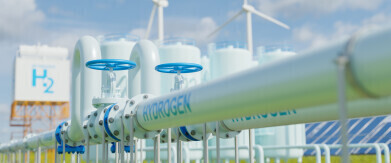Hydrogen fuel
How developed is hydrogen power in the UK?
Feb 28 2024
Earlier this month, the Westminster Energy, Environment and Transport Forum convened to discuss the next phase of investment and regulation for Britain’s nascent hydrogen economy, attended by leading lights from various multinationals, green private equity, energy generation, and law. So, if these are the next steps, just how far along are we already?
For over a year now, what was the Department for Business, Energy and Industry Strategy (BEIS) has been re-branded the Department for Energy Security and Net Zero (DESNZ), but it inherited its target for hydrogen capacity wholesale: 10GW of capacity by 2030. Accounting for projected increases in overall capacity by the end of the decade, hydrogen will contribute around 8% of Britain’s wattage if this target ends up being met – and according to the British Geological Survey’s estimates in last year’s scoping report for the hydrogen economy, all of the hydrogen projects currently at some stage of development amount to roughly 20GW of capacity. Broadly, then, we’re on track.
But unlike your typical commodity, it’s not a matter of simply drawing up a business plan and bringing it to market. Although it can be slotted into some existing infrastructure, hydrogen does require lots of dedicated infrastructure, including new storage, transport and distribution vessels as well as specialised combustion chambers. As things stand, DESNZ has a framework for funding projects that will plug these gaps, specifically on-shore pipelines, using subsidies and revenue floors to insulate investors from risk in the hopes that this encourage more investment. Relatedly, the Department is forging ahead with a plan to blend hydrogen into Britain’s natural gas distribution networks, allowing up to a fifth of volumes to be hydrogen in certain circumstances. For the moment, though, this scheme won’t progress past further trials.
Nevertheless, it’s clear that members of both Britain’s business community and national government are getting increasingly serious about hydrogen. For instance, the UK hydrogen industry’s lobby group, the Hydrogen Energy Association came out in favour of settlements reached at last year’s COP28. One of these was a Declaration of Intent on Mutual Recognition of Certification Schemes for Hydrogen and Derivatives, starting the ball rolling on forming a more robust international market for hydrogen fuel. Another was the partnership between the International Hydrogen Trade Forum, an organisation launched in late July of 2023 by, among others, the governments of Saudi Arabia, Japan, South Korea, the United Arab Emirates, the United Kingdom, the United States and the European Union to develop international trade corridors for hydrogen, and the Hydrogen Council, a pro-hydrogen think tank and lobby group initially created by thirteen high-profile multinationals, including car companies (Honda, BMW Group, Toyota), energy companies (Shell, Total, Engie), a mining company (Anglo American), a chemical company (Linde) and a train manufacturer (Alstom). This partnership will provide oversight for the Public-Private Action Statement (PPAS), itself announced at COP28, which is designed to mitigate supply-chain concerns for hydrogen markets through co-operation between governments and private industry. Lastly, COP28 established plans to set a global benchmark for hydrogen’s GHG emissions, another sign that hydrogen is on its way to being a significant aspect of the world’s fuel mix.
But you might be saying: “Where is it all?” And it’s true, not very much of this exciting future has actually materialised just yet – but we do have concrete commitments by various big-ticket companies. One of the UK’s most ambitious renewable and low-carbon energy firms, Carlton Power has announced its plans to build a 20MW green hydrogen plant to service Kraft Heinz’s Wigan plant, one of Europe’s largest food processing units, with larger-scale projects being pitched for Scotland, the Southwest, Cumbria and Manchester. Another dedicated plant will be built by HyNet – a consortium of developers, energy producers and manufacturers (including Tarmac, Jaguar Land Rover and Unilever) interested in developing the UK’s hydrogen economy – in Ellesmere Port, Cheshire, for local glass manufacturers. Two heavy-hitting hydrogen firms, Europe’s hydrogen producers Lhyfe and Ireland’s Source Gallileo, have partnered to develop sites across the UK and Ireland.
Digital Edition
PIN 26.1 Feb/Mar 2025
March 2025
Analytical Instrumentation - Elemental Analysis for Quality and Process Control at Refineries, for Lubricants and Wear Metals in Engine Oils - Synthetic Lubricants: New Developments - Scaling...
View all digital editions
Events
Apr 08 2025 Birmingham, UK
Apr 08 2025 Kielce, Poland
Apr 08 2025 Ravenna, Italy
Apr 08 2025 Southampton, UK
Apr 08 2025 London, UK



















